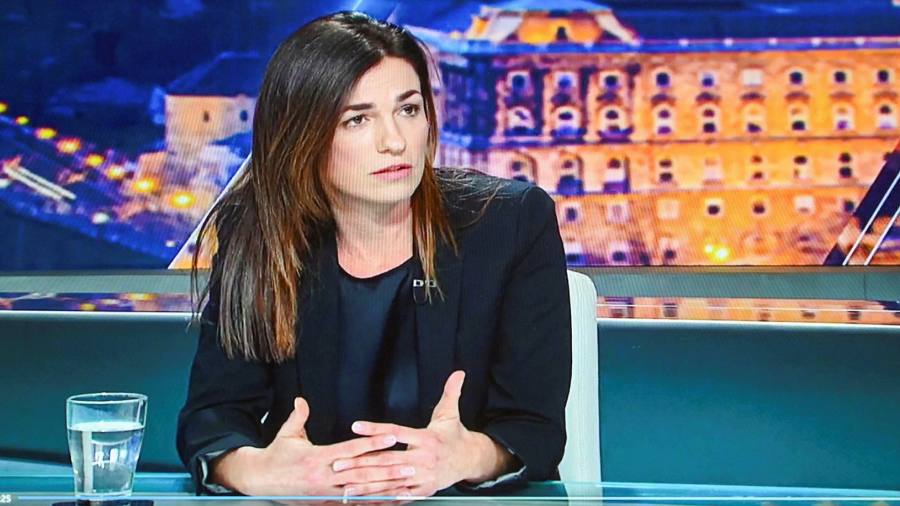[ad_1]
Hungary and Poland intend to take measures against social media companies to fight what they believe is bias against conservatives.Â
Judit Varga, Hungary’s justice minister, announced last week in the wake of former US president Donald Trump’s permanent expulsion from Facebook and Twitter that the hardline government of premier Viktor Orban would not tolerate intrusions on free speech. Earlier in January, Poland’s conservative-nationalist administration proposed legislation that would make it possible for social media companies to be fined for removing posts that do not break Polish law.
The announcements were made as the EU struggles to adopt a co-ordinated approach to policing social media content. While many western European countries are trying to fight the dissemination of violent far-right or extremist religion-based rhetoric, eastern European states say they are intent on combating what Ms Varga called “deliberate, ideological†censorship on social media.
In a recent post on Facebook, Ms Varga said she intended to submit a bill in the spring to “regulate the domestic operations of large tech companiesâ€.
“Today anyone can be disconnected from the online space without the possibility of any formal, transparent, fair procedure and legal remedy,†she wrote. She alleged in an earlier post that she had been “shadow banned†by Facebook, which is a term used to describe cases in which the visibility of an account’s social media posts is reduced without explanation or official reason.Â
Ms Varga also complained that mainstream social media sites “limit the visibility of Christian, conservative, rightwing opinions†and accused “power groups behind global tech giants†of having the power to decide elections. Mr Orban, who enjoys a parliamentary supermajority, faces parliamentary elections in 2022 that are expected to be the most fiercely contested since he returned to power in 2010.
Poland has already proposed concrete measures to fight against perceived anti-rightwing bias. Users who have had posts removed or their accounts blocked will be able to appeal to a body called the Free Speech Council to have their content reinstated. If social media companies are deemed to have removed posts or blocked accounts that are not illegal and refuse to reinstate them, they could face fines of up to 50m zloty (€11m).
Sebastian Kaleta, Poland’s deputy justice minister, said the legislation was necessary to ensure that social media groups did not remove posts simply because they disagreed with them.
“We see that anonymous social media moderators often censor opinions which do not violate the law but are just criticism of leftists’ agenda. This creates important risks of infringing freedom of speech,†he told the Financial Times.
“We are trying to protect our citizens from censorship on social media. [Social media groups] should delete only content which is illegal. Only a competent authority may decide what does or does not violate the law.â€
Mr Kaleta said that in his opinion the moves by Facebook and Twitter to block the accounts of Mr Trump after his supporters stormed the Capitol in January were “a form of censorshipâ€. But he said that this had not had any impact on the Polish government’s plans and that it had been working on the proposed bill since the beginning of 2020.
Poland’s government, like Hungary’s, has itself been accused of presiding over a sustained decline in media freedom. Critics say that the main state broadcaster has been reduced to a government mouthpiece, while last year a scandal erupted over the alleged censorship of a song criticising the ruling Law and Justice party’s leader, Jaroslaw Kaczynski, on a public radio station. In December, Orlen, a state-controlled refining group, bought up 20 of Poland’s 24 regional newspapers.
However, Mateusz Morawiecki, Poland’s prime minister, said the proposed changes were necessary because social media groups had increasingly “introduced their own standards of political correctness, and they fight those who oppose themâ€.
“The censoring of free speech, once the domain of totalitarian and authoritarian regimes, is now back, but in a new form, run by corporations, who silence those who think differently,†he wrote on Facebook last month. “Discussion consists in the exchange of views, not in silencing people. We do not have to agree with what our opponents write, but we cannot forbid anyone from expressing views that do not contravene the law.â€
EU officials are worried that member states, including France and Germany, are enacting their own version of the digital rules that Brussels regulators are seeking to introduce for the bloc as a whole.
Margrethe Vestager, the EU’s executive vice-president in charge of digital policy, has urged online platforms to get behind Brussels’ proposed legislation or risk having to grapple with an uneven patchwork of national laws.
She told the FT: “I think that is really a very strong argument to say to the platforms: ‘Well, you either have this or you would have a completely fragmented European legal system.’â€
Last month regulators published two pieces of draft legislation aimed at clarifying the role Big Tech has when policing the internet and at curbing its growing power amid concerns that large online platforms such as Google and Facebook have become “too big to careâ€.Â
Ms Varga said that while Hungary “continues to co-operate to prepare the EU’s regulation [on social media], recent events have shown that we need to move faster to protect peopleâ€.
[ad_2]
Source link






